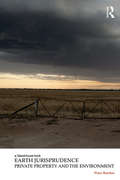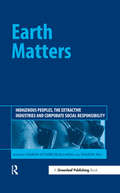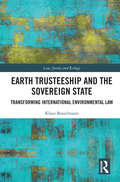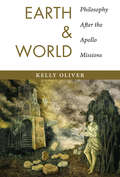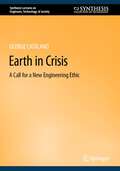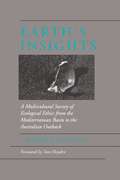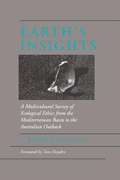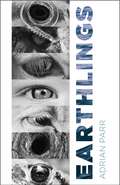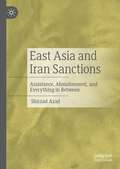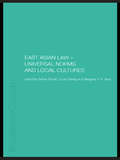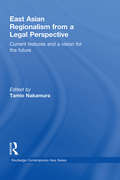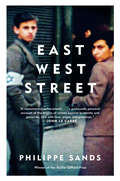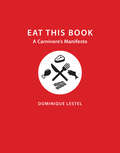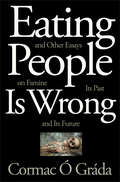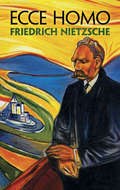- Table View
- List View
Earth Jurisprudence: Private Property and the Environment (Law, Justice and Ecology)
by Peter D. BurdonThe idea of human dominion over nature has become entrenched by the dominant rights-based interpretation of private property. Accordingly, nature is not attributed any inherent value and becomes merely the matter of a human property relationship. Earth Jurisprudence: Private Property and the Environment explores how an alternative conception of property might be instead grounded in the ecocentric concept of an Earth community. Recognising that human beings are deeply interconnected with and dependent on nature, this concept is proposed as a standard and measure for human law. This book argues that the anthropocentric institution of private property needs to be reconceived; drawing on international case law, indigenous views of property and the land use practices of agrarian communities, Peter Burdon considers how private property can be reformulated in a way that fosters duties towards nature. Using the theory of earth jurisprudence as a guide, he outlines an alternative ecocentric description of private property as a relationship between and among members of the Earth community. This book will appeal to those researching in law, justice and ecology, as well as anyone pursuing an interest more particularly in earth jurisprudence.
Earth Matters: Indigenous Peoples, the Extractive Industries and Corporate Social Responsibility
by Ciaran O'Faircheallaigh Saleem AliIndigenous peoples have historically gained little from large-scale resource development on their traditional lands, and have suffered from its negative impacts on their cultures, economies and societies. During recent decades indigenous groups and their allies have fought hard to change this situation: in some cases by opposing development entirely; in many others by seeking a fundamental change in the distribution of benefits and costs from resource exploitation. In doing so they have utilised a range of approaches, including efforts to win greater recognition of indigenous rights in international fora; pressure for passage of national and state or provincial legislation recognising indigenous land rights and protecting indigenous culture; litigation in national and international courts; and direct political action aimed at governments and developers, often in alliance with non-governmental organisations (NGOs). At the same time, and partly in response to these initiatives, many of the corporations that undertake large-scale resource exploitation have sought to address concerns regarding the impact of their activities on indigenous peoples by adopting what are generally referred to as "corporate social responsibility" (CSR) policies. This book focuses on such corporate initiatives. It does not treat them in isolation, recognising that their adoption and impact is contextual, and is related both to the wider social and political framework in which they occur and to the activities and initiatives of indigenous peoples. It does not treat them uncritically, recognising that they may in some cases consist of little more than exercises in public relations. However, neither does it approach them cynically, recognising the possibility that, even if CSR policies and activities reflect hard-headed business decisions, and indeed perhaps particularly if they do so, they can generate significant benefits for indigenous peoples if appropriate accountability mechanisms are in place. In undertaking an in-depth analysis of CSR and indigenous peoples in the extractive industries, the book seeks to answer the following questions. What is the nature and extent of CSR initiatives in the extractive industries and how should they be understood? What motivates companies to pursue CSR policies and activities? How do specific political, social and legal contexts shape corporate behaviour? What is the relationship between indigenous political action and CSR? How and to what extent can corporations be held accountable for their policies and actions? Can CSR help bring about a fundamental change in the distribution of benefits and costs from large-scale resource exploitation and, if so, under what conditions can this occur? Earth Matters gathers key experts from around the world who discuss corporate initiatives in Alaska, Ecuador, Australia, Canada, Peru, Papua New Guinea, Indonesia and Russia. The book explores the great diversity that characterises initiatives and policies under the name of "corporate social responsibility", the highly contingent and contextual nature of corporate responses to indigenous demands, and the complex and evolving nature of indigenous–corporate relations. It also reveals much about the conditions under which CSR can contribute to a redistribution of benefits and costs from large-scale resource development. Earth Matters will be essential reading for those working in and studying the extractive industry worldwide, as well as those readers looking for a state-of-the-art description of how CSR is functioning in perhaps its most difficult setting.
Earth Trusteeship and the Sovereign State: Transforming International Environmental Law (Law, Justice and Ecology)
by Klaus BosselmannThis book makes an argument for the legal role and responsibility of sovereign states in the trusteeship of the Earth.In 1972, the first photo of the Earth – Blue Marble – sparked the imagination and need to care for our planet. In the same year, the world’s first UN conference on the environment adopted the Stockholm Declaration, proclaiming that the Earth’s natural resources and ecosystems "must be safeguarded for the benefit of present and future generations". Today, the Earth’s ecological systems deteriorate at accelerating speeds, as if Earth does not matter to law and governance. But what if it does? Earth system science and related jurisprudence provide clear guidance for effective law and governance, in particular the trusteeship responsibilities of sovereign states. This book closes the gap between the promises of international environmental agreements and the concept of state sovereignty. Maintaining that state sovereignty is not an end in itself, but rather a means to protect the autonomy and freedom of citizens, the book develops the argument that sovereignty includes fiduciary duties for matters of global concern, such as human rights and ecological sustainability. Autonomy and freedom of citizens can only prosper if states protect human rights and ecological sustainability both inside and outside national boundaries. This is the logic behind global governance. And, as this book demonstrates, at its core stands the ancient idea of trusteeship: that is, of acting on behalf and to the benefit of those who cannot act for themselves.This book’s argument that Earth trusteeship and the sovereign state mutually condition each other will appeal to scholars of environmental law, international law and environmental science and others with an interest in ecology and global governance.
Earth and World
by Kelly OliverCritically engaging the work of Immanuel Kant, Hannah Arendt, Martin Heidegger, and Jacques Derrida together with her own observations on contemporary politics, environmental degradation, and the pursuit of a just and sustainable world, Kelly Oliver lays the groundwork for a politics and ethics that embraces otherness without exploiting difference. Rooted firmly in human beings' relationship to the planet and to each other, Oliver shows peace is possible only if we maintain our ties to earth and world.Oliver begins with Immanuel Kant and his vision of politics grounded on earth as a finite surface shared by humans. She then incorporates Hannah Arendt's belief in plural worlds constituted through human relationships; Martin Heidegger's warning that alienation from the Earth endangers not only politics but also the very essence of being human; and Jacques Derrida's meditations on the singular worlds individuals, human and otherwise, create and how they inform the reality we inhabit. Each of these theorists, Oliver argues, resists the easy idealism of world citizenship and globalism, yet they all think about the earth against the globe to advance a grounded ethics. They contribute to a philosophy that avoids globalization's totalizing and homogenizing impulses and instead help build a framework for living within and among the world's rich biodiversity.
Earth and World: Philosophy After the Apollo Missions
by Kelly OliverCritically engaging the work of Immanuel Kant, Hannah Arendt, Martin Heidegger, and Jacques Derrida together with her own observations on contemporary politics, environmental degradation, and the pursuit of a just and sustainable world, Kelly Oliver lays the groundwork for a politics and ethics that embraces otherness without exploiting difference. Rooted firmly in human beings' relationship to the planet and to each other, Oliver shows peace is possible only if we maintain our ties to earth and world.Oliver begins with Immanuel Kant and his vision of politics grounded on earth as a finite surface shared by humans. She then incorporates Hannah Arendt's belief in plural worlds constituted through human relationships; Martin Heidegger's warning that alienation from the Earth endangers not only politics but also the very essence of being human; and Jacques Derrida's meditations on the singular worlds individuals, human and otherwise, create and how they inform the reality we inhabit. Each of these theorists, Oliver argues, resists the easy idealism of world citizenship and globalism, yet they all think about the earth against the globe to advance a grounded ethics. They contribute to a philosophy that avoids globalization's totalizing and homogenizing impulses and instead help build a framework for living within and among the world's rich biodiversity.
Earth in Crisis: A Call for a New Engineering Ethic (Synthesis Lectures on Engineers, Technology, & Society #26)
by George CatalanoThis book examines the ethical responsibilities of engineers and scientists in light of new advances in science with a distinct reflection on quantum mechanics. This thorough coverage of these new advances will assist the reader in rethinking our place in the universe and broadening a sense of ethical responsibility for the planet. This book addresses an approach to integrating these changes and deal with issues such as global climate change and the sixth extinction. This book compares new ideas in engineering that extend ethical boundaries beyond our present understanding in which Engineering ethics is locked in the world view of the 18th and 19th centuries. This books coverage examines how our understanding of the world has changed due to developments in science and society to include green, humanitarian, social justice, and omnium approaches to the engineering profession. The coverage of societal and ethics in science and engineering practice are examined through four major areas. Green engineering is the design that promotes the use of processes and products that minimize pollution, promote sustainability, and protect human health without sacrificing economic viability and efficiency. Humanitarian engineering seeks to directly improve the well-being of poor, marginalized, or under-served communities, which often lack the means to address pressing problems. Engineering for social justice imagines a new kind of engineering firmly affixed to the common good. Finally, a new approach, omnium engineering, seeks to promote an engineering profession that considers the wants and needs of all life forms not only that of the human speciesThe scope of this treatise is to examine the premise that the earth is facing grave crises when confronting global climate change and the sixth extinction. Engineering may be the planet’s last best hope, but it requires a new ethic that takes a much broader view of the profession’s ethical responsibilities. Moreover, the engineering ethic is rooted in the science of the past (Newtonian mechanic). Science has changed (quantum mechanics) but the engineering world view has not. Embracing this new science will inevitably lead to a new story of our responsibilities towards the planet.
Earth's Insights
by J. Baird CallicottThe environmental crisis is global in scope, yet contemporary environmental ethics is centered predominantly in Western philosophy and religion. Earth's Insights widens the scope of environmental ethics to include the ecological teachings embedded in non-Western worldviews. J. Baird Callicott ranges broadly, exploring the sacred texts of Islam, Hinduism, Jainism, Taoism, Confucianism, and Zen Buddhism, as well as the oral traditions of Polynesia, North and South America, and Australia. He also documents the attempts of various peoples to put their environmental ethics into practice. Finally, he wrestles with a question of vital importance to all people sharing the fate of this small planet: How can the world's many and diverse environmental philosophies be brought together in a complementary and consistent whole?
Earth's Insights: A Multicultural Survey of Ecological Ethics from the Mediterranean Basin to the Australian Outback
by J. Baird CallicottAlthough environmental crisis is global in scope, contemporary environmental ethics is centered predominantly in Western philosophy and religion. EARTH'S INSIGHTS widens the scope to include the ecological teachings embedded in non-Western world views. Conservationist J. Baird Callicott asks how the world's diverse environmental philosophies can be brought together to benefit the whole.
Earth, Our Living Planet: The Earth System and its Co-evolution With Organisms (The Frontiers Collection)
by Philippe Bertrand Louis LegendreEarth is, to our knowledge, the only life-bearing body in the Solar System. This extraordinary characteristic dates back almost 4 billion years. How to explain that Earth is teeming with organisms and that this has lasted for so long? What makes Earth different from its sister planets Mars and Venus? The habitability of a planet is its capacity to allow the emergence of organisms. What astronomical and geological conditions concurred to make Earth habitable 4 billion years ago, and how has it remained habitable since? What have been the respective roles of non-biological and biological characteristics in maintaining the habitability of Earth? This unique book answers the above questions by considering the roles of organisms and ecosystems in the Earth System, which is made of the non-living and living components of the planet. Organisms have progressively occupied all the habitats of the planet, diversifying into countless life forms and developing enormous biomasses over the past 3.6 billion years. In this way, organisms and ecosystems "took over" the Earth System, and thus became major agents in its regulation and global evolution. There was co-evolution of the different components of the Earth System, leading to a number of feedback mechanisms that regulated long-term Earth conditions. For millennia, and especially since the Industrial Revolution nearly 300 years ago, humans have gradually transformed the Earth System. Technological developments combined with the large increase in human population have led, in recent decades, to major changes in the Earth's climate, soils, biodiversity and quality of air and water. After some successes in the 20th century at preventing internationally environmental disasters, human societies are now facing major challenges arising from climate change. Some of these challenges are short-term and others concern the thousand-year evolution of the Earth's climate. Humans should become the stewards of Earth.
Earthlings: Imaginative Encounters with the Natural World
by Adrian ParrAmid environmental catastrophe, it is vital to recall what unites all forms of life. We share characteristics and genetic material extending back billions of years. More than that, we all—from humans to plants to bacteria—share a planet. We are all Earthlings.Adrian Parr calls on us to understand ourselves as existing with and among the many forms of Earthling life. She argues that human survival requires us to recognize our interdependent relationships with the other species and systems that make up life on Earth. In a series of meditations, Earthlings portrays the wonder and beauty of life with deep feeling, vivid detail, and an activist spirit. Parr invites readers to travel among the trees of the Amazonian rainforest; take flight with birds and butterflies migrating through the skies; and plunge into the oceans with whales and polar bears—as well as to encounter bodies infected with deadly viruses and maimed by the violence of global capitalism.Combining poetic observation with philosophical contemplation and scientific evidence, Parr offers a moving vision of a world in upheaval and a potent manifesto for survival. Earthlings is both a joyful celebration of the magnificence of the biosphere and an urgent call for action to save it.
East Asia and Iran Sanctions: Assistance, Abandonment, and Everything in Between
by Shirzad AzadThis book explores how international sanctions on Iran reshaped the contours of East Asia’s interactions with the Middle Eastern state. Almost all East Asian political entities, from the industrialized and developed nations of Japan and South Korea, to the communist and developing countries of China and North Korea, have become major international partners of Iran over the past several decades. In addition, East Asian states were, by and large, thought to be among leading foreign beneficiaries of Iran sanctions, and the overall impacts of sanctions in transforming both the scope and size of their rather multifaceted connections to the Middle Eastern country have been consequential. Despite its significance, academic studies about this topic have remained sparse and scattered. This book aims to partially fill that research lacuna by surveying all relevant information and data available in the archives of several languages, including Chinese, English, Japanese, Korean, and Persian. While the book strives to cover the entire sanctions period, most of the analysis focuses on the past one and a half decades, when Iran came under the severest sets of international sanctions. It was during this particular time period that international quandary over the Iranian nuclear program led to a slew of far-reaching penalties and stringent restrictions levied against Iranians by the United Nations and the United States. These recent waves of international sanctions and limitations transformed many quintessential characteristics of East Asia’s interactions with Iran. Such sanctions-induced critical developments and changes, moreover, are bound to play an instrumental role in the direction and volume of exchanges between East Asian states and Iran in the coming years and decades.
East Asian Labor and Employment Law
by Ronald C. BrownThis book deals with international labor and employment law in the East Asia Region (EA), particularly dealing with China, South Korea and Japan. It explores and explains the effects of globalization and discusses the role played by international labor law as it affects lawyers, business, labor, labor unions and human resource management, and the labor issues that can arise in dealing in EA trade and investment. The text, and the readings (from area experts), are organized and written to provide the reader with, first, a broad understanding and insight into the global dimensions of the fast-emerging area of labor and employment issues (e. g. , global legal standards and their interplay with domestic and foreign laws); and second, to show how these laws and approaches play out in specific EA countries (comparing global approaches with the specific laws of each country on four common agenda items: regulatory administration, workers' rights, trade unions and dispute resolution). The book should be of interest not only to lawyers, students, human resource personnel and government officials, but also to business investors, managers and members of the public interested in the growing phenomenon of changing labor laws and societies in China, South Korea and Japan.
East Asian Law: Universal Norms and Local Cultures
by Lucie Cheng Arthur Rosett Margaret Y.K. WooThis work explores the tension in East Asia between the trend towards a convergence of legal practices in the direction of a universal model and a reassertion of local cultural practices. The trend towards convergence arises in part from 'globalisation', from 'rule of law programs' promulgated by institutions such as the International Monetary Fund and the Asian Development Bank, and from widespread migration in the region, whilst the opposing trend arises in part from moves to resist such 'globalisation'. This book explores a wide range of issues related to this key problem, covering China in particular, where resolving differences in conceptions about the rule of law is a key issue as China begins to integrate itself into the World Trade Organisation regime.
East Asian Regionalism from a Legal Perspective: Current features and a vision for the future (Routledge Contemporary Asia Series)
by Tamio NakamuraPlenty has been written about the political and economical aspects of regionalism, but the legal perspective has been neglected. East Asian Regionalism From a Legal Perspective is unique in synthesizing legal, economic and political analyses. In the first part, the book investigates the current features of regionalism from a comparative perspective, looking at economic and currency cooperation and comparing Asian regionalism with Europe and Latin America. In the second part, the contributors go on to look at the present legal features of regionalism, covering institutional frameworks, trade diversity and regional integration. The third part of the book is truly unique in proposing an essential groundwork for the institutionalisation of an East Asian Community. It conceives a draft East Asian Charter, an essential document that distils what East Asian nations have achieved, and also includes integral principles and fundamental rules for future cooperation among countries and peoples in the region. This book will be of interest to graduates and academics interested in regionalism, international relations, international law and Asian studies.
East West Street: On the Origins of "Genocide" and "Crimes Against Humanity"
by Philippe SandsA profound and profoundly important book—a moving personal detective story, an uncovering of secret pasts, and a book that explores the creation and development of world-changing legal concepts that came about as a result of the unprecedented atrocities of Hitler’s Third Reich. East West Street looks at the personal and intellectual evolution of the two men who simultaneously originated the ideas of “genocide” and “crimes against humanity,” both of whom, not knowing the other, studied at the same university with the same professors, in a city little known today that was a major cultural center of Europe, “the little Paris of Ukraine,” a city variously called Lemberg, Lwów, Lvov, or Lviv.The book opens with the author being invited to give a lecture on genocide and crimes against humanity at Lviv University. Sands accepted the invitation with the intent of learning about the extraordinary city with its rich cultural and intellectual life, home to his maternal grandfather, a Galician Jew who had been born there a century before and who’d moved to Vienna at the outbreak of the First World War, married, had a child (the author’s mother), and who then had moved to Paris after the German annexation of Austria in 1938. It was a life that had been shrouded in secrecy, with many questions not to be asked and fewer answers offered if they were.As the author uncovered, clue by clue, the deliberately obscured story of his grandfather’s mysterious life, and of his mother’s journey as a child surviving Nazi occupation, Sands searched further into the history of the city of Lemberg and realized that his own field of humanitarian law had been forged by two men—Rafael Lemkin and Hersch Lauterpacht—each of whom had studied law at Lviv University in the city of his grandfather’s birth, each considered to be the father of the modern human rights movement, and each, at parallel times, forging diametrically opposite, revolutionary concepts of humanitarian law that had changed the world.In this extraordinary and resonant book, Sands looks at who these two very private men were, and at how and why, coming from similar Jewish backgrounds and the same city, studying at the same university, each developed the theory he did, showing how each man dedicated this period of his life to having his legal concept—“genocide” and “crimes against humanity”—as a centerpiece for the prosecution of Nazi war criminals. And the author writes of a third man, Hans Frank, Hitler’s personal lawyer, a Nazi from the earliest days who had destroyed so many lives, friend of Richard Strauss, collector of paintings by Leonardo da Vinci. Frank oversaw the ghetto in Lemberg in Poland in August 1942, in which the entire large Jewish population of the area had been confined on penalty of death. Frank, who was instrumental in the construction of concentration camps nearby and, weeks after becoming governor general of Nazi-occupied Poland, ordered the transfer of 133,000 men, women, and children to the death camps. Sands brilliantly writes of how all three men came together, in October 1945 in Nuremberg—Rafael Lemkin; Hersch Lauterpacht; and in the dock at the Palace of Justice, with the twenty other defendants of the Nazi high command, prisoner number 7, Hans Frank, who had overseen the extermination of more than a million Jews of Galicia and Lemberg, among them, the families of the author’s grandfather as well as those of Lemkin and Lauterpacht. A book that changes the way we look at the world, at our understanding of history and how civilization has tried to cope with mass murder. Powerful; moving; tender; a revelation.
East West Street: Winner of the Baillie Gifford Prize
by Philippe SandsTHE BRITISH BOOK AWARDS NON-FICTION BOOK OF THE YEAR 2017WINNER OF THE BAILLIE GIFFORD PRIZE and THE JQ-WINGATE LITERARY PRIZETHE SUNDAY TIMES TOP 10 BESTSELLER'A monumental achievement: profoundly personal, told with love, anger and great precision' John le Carré'One of the most gripping and powerful books imaginable' SUNDAY TIMESWhen he receives an invitation to deliver a lecture in the Ukrainian city of Lviv, international lawyer Philippe Sands begins a journey on the trail of his family's secret history. In doing so, he uncovers an astonishing series of coincidences that lead him halfway across the world, to the origins of international law at the Nuremberg trial. Interweaving the stories of the two Nuremberg prosecutors (Hersch Lauterpacht and Rafael Lemkin) who invented the crimes or genocide and crimes against humanity, the Nazi governor responsible for the murder of thousands in and around Lviv (Hans Frank), and incredible acts of wartime bravery, EAST WEST STREET is an unforgettable blend of memoir and historical detective story, and a powerful meditation on the way memory, crime and guilt leave scars across generations.WINNER OF THE HAY FESTIVAL MEDAL FOR PROSE 2017
East West Street: Winner of the Baillie Gifford Prize
by Philippe SandsWINNER OF THE BAILLIE GIFFORD PRIZE FOR NON-FICTION'A monumental achievement: profoundly personal, told with love, anger and great precision' - John le Carré'A triumph of astonishing research ... No novel could possibly match such an important work of truth' - Antony Beevor'Magnificent ... I was moved to anger and to pity. In places I gasped, in places I wept. I wanted to reach the end. I couldn't wait to reach the end. And then when I got there I didn't want to be at the end' - The TimesWhen human rights lawyer Philippe Sands received an invitation to deliver a lecture in the western Ukrainian city of Lviv, he began to uncover a series of extraordinary historical coincidences. It set him on a quest that would take him halfway around the world in an exploration of the origins of international law and the pursuit of his own secret family history, beginning and ending with the last day of the Nuremberg Trials. Part historical detective story, part family history, part legal thriller, Philippe Sands guides us between past and present as several interconnected stories unfold in parallel. The first is the hidden story of two Nuremberg prosecutors who discover, only at the end of the trials, that the man they are prosecuting may be responsible for the murder of their entire families in Nazi-occupied Poland, in and around Lviv. The two prosecutors, Hersch Lauterpacht and Rafael Lemkin, were remarkable men, whose efforts led to the inclusion of the terms 'crimes against humanity' and 'genocide' in the judgement at Nuremberg. The defendant, Hans Frank, Hitler's personal lawyer and Governor-General of Nazi-occupied Poland, turns out to be an equally compelling character.The lives of these three men lead Sands to a more personal story, as he traces the events that overwhelmed his mother's family in Lviv and Vienna during the Second World War. At the heart of this book is an equally personal quest to understand the roots of international law and the concepts that have dominated Sands' work as a lawyer. Eventually, he finds unexpected answers to his questions about his family, in this powerful meditation on the way memory, crime and guilt leave scars across generations, and the haunting gaps left by the secrets of others.Read by Philippe Sands and David Rintoul(p) 2016 Orion Publishing Group
Easy Beauty: A Memoir
by Chloé Cooper JonesFrom Chloé Cooper Jones—Pulitzer Prize finalist, philosophy professor, Whiting Creative Nonfiction Grant recipient—a groundbreaking memoir about disability, motherhood, and a journey to far-flung places in search of a new way of seeing and being seen. <p><p> “I am in a bar in Brooklyn, listening to two men, my friends, discuss whether my life is worth living.” <p><p> So begins Chloé Cooper Jones’s bold, revealing account of moving through the world in a body that looks different than most. Jones learned early on to factor “pain calculations” into every plan, every situation. <p><p> Born with a rare congenital condition called sacral agenesis which affects both her stature and gait, her pain is physical. But there is also the pain of being judged and pitied for her appearance, of being dismissed as “less than.” The way she has been seen—or not seen—has informed her lens on the world her entire life. She resisted this reality by excelling academically and retreating to “the neutral room in her mind” until it passed. But after unexpectedly becoming a mother (in violation of unspoken social taboos about the disabled body), something in her shifts, and Jones sets off on a journey across the globe, reclaiming the spaces she’d been denied, and denied herself. <p><p> From the bars and domestic spaces of her life in Brooklyn to sculpture gardens in Rome; from film festivals in Utah to a Beyoncé concert in Milan; from a tennis tournament in California to the Killing Fields of Phnom Penh, Jones weaves memory, observation, experience, and aesthetic philosophy to probe the myths underlying our standards of beauty and desirability, and interrogates her own complicity in upholding those myths. With its emotional depth, its prodigious, spiky intelligence, its passion and humor, Easy Beauty is the rare memoir that has the power to make you see the world, and your place in it, with new eyes.
Eat This Book
by Gary Steiner Dominique LestelIf we want to improve the treatment of animals, Dominique Lestel argues, we must acknowledge our evolutionary impulse to eat them, and we must expand our worldview to see how others consume meat ethically and sustainably. The position of vegans and vegetarians is unrealistic and exclusionary. Eat This Book calls at once for a renewed and vigorous defense of animal rights and a more open approach to meat eating that turns us into responsible carnivores.A leading French philosopher who has written extensively on animal agency and welfare, Lestel skillfully synthesizes Western philosophical views on the moral status of animals and holistic cosmologies that recognize human-animal reciprocity. Vegetarianism isolates humans from the world by refusing to accept that cruelty, violence, and conflicting interests are part of life. Lestel presents the carnivore's position as more coherently ethical, describing how meat-eaters assume completely, which is to say metabolically, their animal status, appreciating fully the life-giving power of animal flesh. Lestel vehemently condemns factory farming and the terrible footprint of industrial meat eating. His goal is to promote a kinship between humans and animals that we can all support and that in practice reminds us what it means to be tied inextricably to the world.
Eat This Book: A Carnivore's Manifesto (Critical Perspectives on Animals: Theory, Culture, Science, and Law)
by Dominique LestelIf we want to improve the treatment of animals, Dominique Lestel argues, we must acknowledge our evolutionary impulse to eat them and we must expand our worldview to see how others consume meat ethically and sustainably. The position of vegans and vegetarians is unrealistic and exclusionary. Eat This Book calls at once for a renewed and vigorous defense of animal rights and a more open approach to meat eating that turns us into responsible carnivores. Lestel skillfully synthesizes Western philosophical views on the moral status of animals and holistic cosmologies that recognize human-animal reciprocity. He shows that the carnivore's position is more coherently ethical than vegetarianism, which isolates humans from the world by treating cruelty, violence, and conflicting interests as phenomena outside of life. Describing how meat eaters assume completely—which is to say, metabolically—their animal status, Lestel opens our eyes to the vital relation between carnivores and animals and carnivores' genuine appreciation of animals' life-sustaining flesh. He vehemently condemns factory farming and the terrible footprint of industrial meat eating. His goal is to recreate a kinship between humans and animals that reminds us of what it means to be tied to the world.
Eat What You Kill: The Fall of a Wall Street Lawyer
by Milton C. Regan Jr.He had it all, and then he lost it. But why did he do it, risking everything-wealth, success, livelihood, freedom, and the security of family? Eat What You Kill is the story of John Gellene, a rising star and bankruptcy partner at one of Wall Street's most venerable law firms. But when Gellene became entangled in a web of conflicting corporate and legal interests involving one of his clients, he was eventually charged with making false statements, indicted, found guilty of a federal crime, and sentenced to prison. Milton C. Regan Jr. uses Gellene's case to prove that such conflicting interests are now disturbingly commonplace in the world of American corporate finance. Combining a journalist's eye with sharp psychological insight, Regan spins Gellene's story into a gripping drama of fundamental tensions in modern-day corporate practice and describes in perfect miniature the inexorable confluence of the interests of American corporations and their legal counselors. This confluence may seem natural enough, but because these law firms serve many masters-corporations, venture capitalists, shareholder groups-it has paradoxically led to deep, pervasive conflicts of interest. Eat What You Kill gives us the story of a man trapped in this labyrinth, and reveals the individual and systemic factors that contributed to Gellene's demise.
Eating Anxiety: The Perils of Food Politics
by Chad LavinDebates about obesity are really about the meaning of responsibility. The trend toward local foods reflects the changing nature of space due to new communication technologies. Vegetarian theory capitalizes on biotechnology&’s challenge to the meaning of species. And food politics, as this book makes powerfully clear, is actually about the political anxieties surrounding globalization. In Eating Anxiety, Chad Lavin argues that our culture&’s obsession with diet, obesity, meat, and local foods enacts ideological and biopolitical responses to perceived threats to both individual and national sovereignty. Using the occasion of eating to examine assumptions about identity, objectivity, and sovereignty that underwrite so much political order, Lavin explains how food functions to help structure popular and philosophical understandings of the world and the place of humans within it. He introduces the concept of digestive subjectivity and shows how this offers valuable resources for rethinking cherished political ideals surrounding knowledge, democracy, and power. Exploring discourses of food politics, Eating Anxiety links the concerns of food—especially issues of sustainability, public health, and inequality—to the evolution of the world order and the possibilities for democratic rule. It forces us to question the significance of consumerist politics and—simultaneously—the relationship between politics and ethics, public and private.
Eating Ethically: Religion and Science for a Better Diet
by Jonathan K. CraneFew activities are as essential to human flourishing as eating, and fewer still are as ethically fraught. Eating well is particularly confusing. We live amid excess, faced with conflicting recommendations, contradictory scientific studies, and complex moral, medical, and environmental consequences that influence our choices. A new eating strategy is urgently needed, one grounded in ethics, informed by biology, supported by philosophy and theology, and, ultimately, personally achievable.Eating Ethically argues persuasively for more adaptive eating practices. Drawing on religion, medicine, philosophy, cognitive science, art, ethics, and more, Jonathan K. Crane shows how distinguishing among the eater, the eaten, and the act of eating promotes a radical reorientation away from external cues and toward internal ones. This turn is vital for survival, according to classic philosophy on appetite and contemporary studies of satiety, metabolic science as well as metaphysics and religion. By intertwining ancient wisdom from Judaism, Christianity, and Islam with cutting-edge research, Crane concludes that ethical eating is a means to achieve both personal health and social cohesion. Grounded in science and tradition, Eating Ethically shows us what it truly means to eat well.
Eating People Is Wrong, and Other Essays on Famine, Its Past, and Its Future
by Cormac Ó GrádaFamines are becoming smaller and rarer, but optimism about the possibility of a famine-free future must be tempered by the threat of global warming. That is just one of the arguments that Cormac Ó Gráda, one of the world's leading authorities on the history and economics of famine, develops in this wide-ranging book, which provides crucial new perspectives on key questions raised by famines around the globe between the seventeenth and twenty-first centuries.The book begins with a taboo topic. Ó Gráda argues that cannibalism, while by no means a universal feature of famines and never responsible for more than a tiny proportion of famine deaths, has probably been more common during very severe famines than previously thought. The book goes on to offer new interpretations of two of the twentieth century's most notorious and controversial famines, the Great Bengal Famine and the Chinese Great Leap Forward Famine. Ó Gráda questions the standard view of the Bengal Famine as a perfect example of market failure, arguing instead that the primary cause was the unwillingness of colonial rulers to divert food from their war effort. The book also addresses the role played by traders and speculators during famines more generally, invoking evidence from famines in France, Ireland, Finland, Malawi, Niger, and Somalia since the 1600s, and overturning Adam Smith's claim that government attempts to solve food shortages always cause famines.Thought-provoking and important, this is essential reading for historians, economists, demographers, and anyone else who is interested in the history and possible future of famine.
Ecce Homo
by Friedrich Nietzsche Anthony M. LudoviciFor the title of his autobiography, Friedrich Nietzsche chose Pilate's words upon discharging Christ to the mob: Ecce Homo, or "Behold the man." The original subtitle, How One Becomes What One Is, suggests a psychologically intriguing exploration of the philosopher's personal history. Nietzsche fulfills that promise with a dramatic summation of his life and career that turns conventional notions of autobiography inside out.Published posthumously in 1908, Ecce Homo was written in 1888 and completed just a few weeks before Nietzsche's complete mental collapse. Its outrageously egotistical review of the philosopher's life and works — featuring chapters called Why I Am So Wise and Why I Write Such Good Books — are redeemed from mere arrogance by masterful language and ever-relevant ideas. In addition to settling scores with his many personal and philosophical enemies (including Richard Wagner, German nationalism, and Christianity), Nietzsche emphasizes the importance of questioning traditional morality, establishing autonomy, and making a commitment to creativity.Essential reading for students of philosophy, this unique memoir is crucial to an understanding of Nietzsche's other works.
